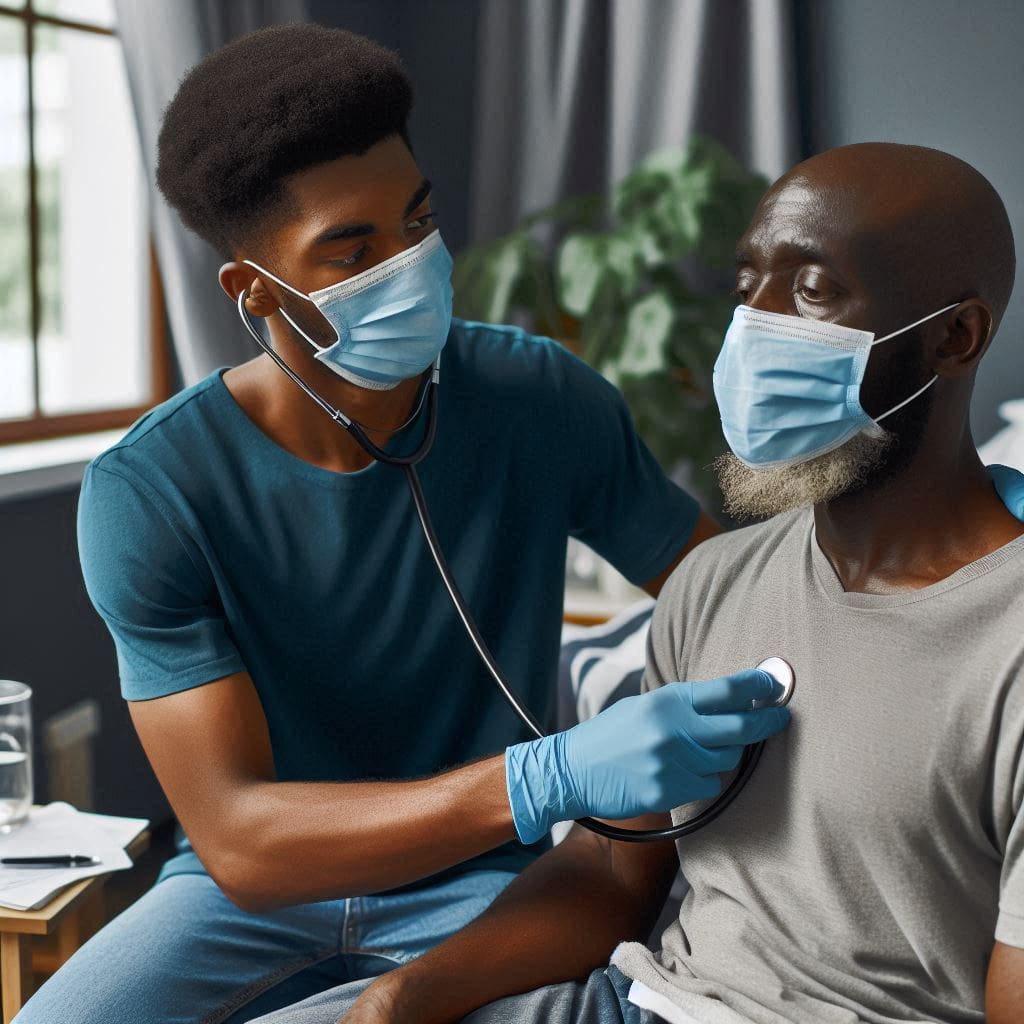Protecting Yourself from Tuberculosis in Nigeria
Tuberculosis (TB) is a serious infectious disease that primarily affects the lungs. Caused by bacteria called Mycobacterium tuberculosis, Tuberculosis spreads when an infected person coughs or sneezes and releases the bacteria into the air.
While not everyone who is exposed to Tuberculosis will develop the illness, it’s crucial to be aware of the symptoms, treatment options, and preventative measures.
This comprehensive guide dives deep into understanding Tuberculosis, empowering Nigerians with the knowledge to safeguard themselves and their loved ones.
Understanding Tuberculosis in Nigeria
Tuberculosis is a significant public health concern in Nigeria. According to the World Health Organization (WHO), Nigeria ranks among the top 14 high TB burden countries globally.
This highlights the importance of widespread awareness and education about Tuberculosis in Nigerian communities.
There are two main forms of TB infection:
- Latent Tuberculosis Infection (LTBI): This is when a person has the TB bacteria in their body but isn’t sick and cannot spread the infection to others. LTBI often shows no symptoms and can remain dormant for years.
- Active TB Disease: This is when the Tuberculosis bacteria multiplies and causes symptoms. People with active TB can spread the infection to others through coughing, sneezing, or speaking.
Symptoms of Active TB
Early diagnosis and treatment are vital to prevent the spread of Tuberculosis. Here’s a breakdown of the common symptoms of active TB to watch out for:
- A persistent cough lasting more than 3 weeks: This is the most common symptom of TB. The cough may be productive, meaning it brings up phlegm (mucus).
- Coughing up blood or blood-stained mucus: This is a concerning symptom and requires immediate medical attention.
- Chest pain or chest pain that worsens with coughing or breathing deeply: This pain can be sharp or stabbing and may be felt anywhere in the chest.
- Unexplained weight loss: You may lose weight without trying due to decreased appetite or the body using more energy to fight the infection.
- Fatigue and feeling tired all the time: TB can drain your energy levels, making it difficult to carry out daily activities.
- Loss of appetite: This can lead to weight loss and make it harder for the body to fight infection.
- Night sweats: Waking up in the middle of the night drenched in sweat is a common symptom of TB.
- Fever: You may have a low-grade fever that persists for several weeks.
- Chills: You may experience chills along with a fever.
- Swelling in the lymph nodes: The lymph nodes in your chest, neck, or armpits may become swollen and tender.

It’s important to note that some of these symptoms can be caused by other illnesses. However, if you experience any of these symptoms, especially a persistent cough lasting more than 3 weeks, it’s crucial to consult a healthcare professional to get tested for Tuberculosis.
Getting Tested for TB
If you suspect you might have Tuberculosis, your doctor will likely recommend a TB skin test or a blood test. Both tests can help determine if you have a latent Tuberculosis infection or active Tuberculosis disease.
- TB Skin Test (TST): This is the most common TB test used in Nigeria. A healthcare professional injects a small amount of purified protein derivative (PPD) under the skin of your forearm. If you have been infected with TB bacteria, a raised bump will appear at the injection site within 48-72 hours. However, a positive TST doesn’t always mean you have active TB. You may need further tests to confirm the diagnosis.
- Interferon Gamma Release Assay (IGRA): This is a blood test that measures your immune system’s response to TB infection. IGRAs are becoming more widely used, but they are generally more expensive than TSTs.
Treatment for Active TB
If you are diagnosed with active TB, your doctor will prescribe a combination of antibiotics to kill the TB bacteria.
Treatment typically lasts for 6-9 months, and it’s crucial to complete the entire course of medication, even if your symptoms improve.
Stopping treatment early can lead to drug-resistant TB, which is a more serious and difficult-to-treat form of the disease.
During treatment, it’s essential to take all your medications as directed by your doctor and attend all follow-up appointments.
You may also need to take steps to prevent spreading TB to others, such as covering your mouth and nose when you cough or sneeze and staying home from work or school if you are feeling unwell.
Preventing the Spread of TB
Several measures can be taken to prevent the spread of TB in Nigerian communities:
Early Diagnosis and Treatment: As mentioned earlier, identifying and treating active TB cases promptly is the most effective way to stop the transmission chain.

BCG Vaccination: The Bacillus Calmette-Guérin (BCG) vaccine is a safe and effective vaccine that protects children against severe forms of TB, especially meningitis and disseminated TB.

The National Program on Immunization (NPI) in Nigeria includes BCG vaccination as part of the routine childhood immunization schedule. Ensure your child receives the BCG vaccine at the recommended time.
Improved Ventilation: TB bacteria spread through the air. Ensuring good ventilation in homes, workplaces, and public spaces by opening windows and doors allows for proper air circulation and reduces the risk of airborne transmission.
Cough Etiquette: People with coughs, especially those suspected of having TB, should practice proper cough etiquette. This involves covering your mouth and nose with a tissue when coughing or sneezing and disposing of the tissue properly in a closed bin.
Infection Control in Healthcare Settings: Implementing strict infection control measures in hospitals and clinics is crucial to prevent the spread of TB among healthcare workers and patients.
Addressing Social Determinants of Health: Poverty, malnutrition, and overcrowding increase the risk of TB infection. Addressing these social determinants through improved living conditions, access to nutritious food, and education can significantly contribute to TB prevention efforts.
Living with a TB Patient
If you live with someone who has been diagnosed with active TB, there are steps you can take to protect yourself:
- Ensure Proper Ventilation: As mentioned earlier, maintaining good airflow in your living space is critical. Open windows and doors whenever possible, especially in the room where the TB patient spends most of their time.
- Practice Cough Etiquette: Encourage the TB patient to cover their mouth and nose with a tissue when coughing or sneezing, and dispose of the tissue properly.
- Wear a Mask: If you are in close contact with the TB patient, consider wearing a medical mask, especially if the patient is coughing frequently.
- Get Tested: If you experience any TB symptoms or have concerns about exposure, consult a healthcare professional and get tested for TB.
- Maintain a Healthy Lifestyle: A strong immune system is better equipped to fight off infections. Encourage the TB patient and yourself to maintain a healthy lifestyle with a balanced diet, regular exercise, and adequate sleep.
Additional Resources for TB Information in Nigeria
- National Tuberculosis and Leprosy Control Programme (NTBLCP): https://ntblcp.org.ng/
- World Health Organization (WHO) – TB
- Centers for Disease Control and Prevention (CDC) – TB: https://www.cdc.gov/tb/index.html
- Federal Ministry of Health, Nigeria:
Conclusion
Tuberculosis is a serious but preventable and treatable disease. By being aware of the symptoms, getting tested if you suspect infection, and taking preventive measures, you can significantly contribute to stopping the spread of TB in Nigeria.
Early diagnosis, proper treatment, and adherence to public health guidelines are key to controlling TB and ensuring a healthier future for all Nigerians.
Remember: If you have any concerns about TB, consult a healthcare professional for proper diagnosis and guidance.



